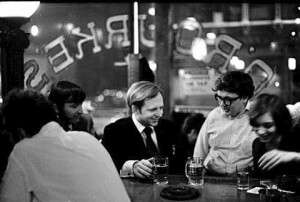The number of people who can speak authoritatively about what it’s like to be a Chicagoan has dropped by one.

Roger Ebert’s death is on par with the passing of Studs Terkel for both Chicago and the world. Studs told the stories of the men and women who made Chicago live and breathe. Roger Ebert told the stories of film and, by extension, humanity writ large. But just as no critic’s view is entirely objective, Ebert’s outlook was informed by a life lived in Illinois, a career steeped in Chicago newspapers and a personality that lept off the page. Many before me have noted how he turned his forced physical silence into a digital journal equal to all his work that came before.
As the Tribune‘s Mark Caro noted today, Roger Ebert was Chicago, moreso than any other person. His bearing, humor, liberalism and enjoyment of bars – prior to his sobriety – were all aspects of this city that many saw as reflections of themselves. His international renown gave average people aspirations of greatness. Michael Jordan was His Airness. Roger Ebert was one of us.
A few other noteworthy links on and by Roger Ebert:
Neil Steinberg’s obituary for Ebert in the Chicago Sun-Times
Rick Kogan’s obituary for him in the Chicago Tribune
Hank Sartin’s 2008 profile of Roger and his wife Chaz in Time Out Chicago, part of its Chicago Heroes package
Carol Felsenthal’s 2005 profile of Roger Ebert in Chicago magazine
Ebert’s essay in the Chicago issue of Granta about legendary journalism drinking spot O’Rourke’s
Siskel and Ebert filming a promo for their TV show and giving each other shit
Chris Jones’s 2010 piece on Roger Ebert for Esquire (“The Essential Man“)
The Playboy Interview with Siskel and Ebert from 1991 (via SFW site longform.org)
Roger Ebert on his love for Twitter
Ebert in Salon in 2011: “I do not fear death I will pass away sooner than most people who read this, but that doesn’t shake my sense of wonder and joy.”
There will never again be someone as influential on the art and business of film as Roger Ebert. Never.
—
Today my former Chicago magazine colleague Jeff Ruby said “Roger Ebert anecdotes are like belly buttons. Everyone’s got one and they’re all great.” Permit me a bit of navel-gazing as I try to make this story live up to that bon mot.
My first professional movie review was for Time Out Chicago, a little more than a year before I’d join the staff as its Web Editor. I’d been writing about movies for Chicagoist and done some other freelance work prior but this was the first time I was paid to cast a critical eye on film. My nervous excitement tempered only a little by my assignment: The Ringer, a Johnny Knoxville movie about…honestly, it’s not important. It was the guy from Jackass so that should tell you everything you need to know.
Versed in Chicago lore, I knew the Lake Street screening room – where I’d be watching the movie – has its own pecking order and seating arrangement. I studied a graphic that appeared as a sidebar in Chicago magazine’s 2005 profile of Ebert but it only covered some of Chicago’s top critics. Not wanting to intrude too far, I chose a seat a couple rows from the back, a few seats from the far right aisle.
And then Roger Ebert sat in the back row and I realized I was sitting directly in front of him. I quickly moved one seat over. But of course I was still in his line of sight.
Behind me, I could hear Ebert talking to his wife and some colleagues. They were discussing an upcoming biopic on Russ Meyer and why he felt Jack Black would not be a good person to play Meyer but a younger James Garner would be. Jokes were made about how radio DJ Steve Dahl should play Ebert; Ebert felt Phillip Seymour Hoffman could play him except Hoffman’s not masculine enough. A streak of his famous humor.
After a few moments, he settled in and I could hear him making the noises of a Midwesterner who’s trying to decide if he’s going to say something or just be nice and suffer through. He leaned forward and asked “Would you mind moving over so you’re not blocking my view of the screen?”
“Oh..was I…er…yes…herrm…ah…yes…I’ll…” I spat out as I gathered my things and moved a couple spots to the side.
“Thank you,” he said to the inarticulate interloper.
I wanted to become a writer because guys like Gene Siskel and Roger Ebert made newspapermen seem larger-than-life. In that one moment, Roger Ebert – merely through his graciousness – gave me the opportunity to elevate my inadvertent rudeness to cocktail chatter. Even in a moment of irritation, he made small human moments seem greater. At least to me.
In health, Roger Ebert taught us how to appreciate art. In sickness, he taught us how to live life to the fullest. In his work, he taught us how to be great.